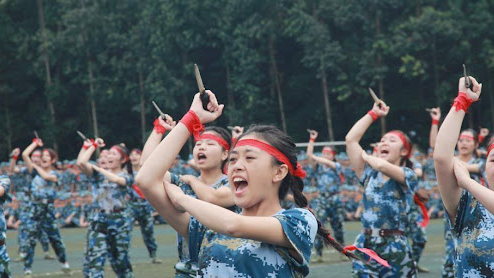
Key Points:
- China’s proposed revisions to its National Defense Education Law seek to mandate military training for high school and university students.
- The changes are driven by economic uncertainties, rising geopolitical tensions, and a desire to strengthen national unity and loyalty to the Chinese Communist Party.
- The proposed revisions have elicited mixed reactions and debate worldwide.
China Proposes Expansion of Military Training in Schools
The Chinese government has recently unveiled proposed revisions to its National Defense Education Law, sparking discussions and raising questions about the role of patriotism and military preparedness in the nation’s education system. The proposed changes, currently under review by the Standing Committee of the National People’s Congress, aim to introduce mandatory military training for high school and university students, with provisions for junior high school students.
Strengthening National Defense Awareness
The revisions to the National Defense Education Law reflect a broader push by the Chinese government to instill a sense of national defense awareness among its citizens, particularly the younger generation. State media reports emphasize the need to adapt to “new domestic and international changes” and highlight the importance of preparing society for potential challenges. Analysts suggest that these changes are driven by economic uncertainties, rising geopolitical tensions, and a desire to strengthen national unity and loyalty to the Chinese Communist Party (CCP).
Implications for the Education System
Implementing the proposed revisions to the National Defense Education Law will necessitate substantial adjustments within China’s education sector. From secondary schools to universities, educational institutions will be tasked with developing and integrating military training programs into their existing curricula. This integration may require reallocating resources, potentially impacting budgets allocated for academic programs and extracurricular activities. Furthermore, infrastructure investments may be necessary to accommodate the logistical demands of military training, such as dedicated training grounds and equipment acquisition.
Mixed Reactions and Concerns
The proposed revisions have elicited mixed reactions both domestically and internationally. Supporters of the changes argue that they must foster a sense of civic duty and national pride among young people, preparing them for potential challenges and threats to national security. They also believe military training can instill discipline, teamwork, and leadership skills in students.
However, concerns have also been raised about the potential impact of these changes. Critics worry that mandatory military training could detract from academic pursuits and limit students’ exposure to diverse perspectives and critical thinking skills. There are also concerns about the potential for increased militarization of Chinese society and the possible exacerbation of nationalist sentiments.
International Implications
The proposed revisions to China’s National Defense Education Law have also drawn attention from the international community. Some observers view the move as a reflection of China’s growing assertiveness on the global stage and its ambition to strengthen its military capabilities. Others express concerns about the potential for increased regional tensions, particularly regarding Taiwan.
The proposed National Defense Education Law revisions are currently under review and open for public comment. How the final legislation will be shaped and implemented remains to be seen. The outcome of this process will have significant implications for China’s education system, society, and role in the international community.
